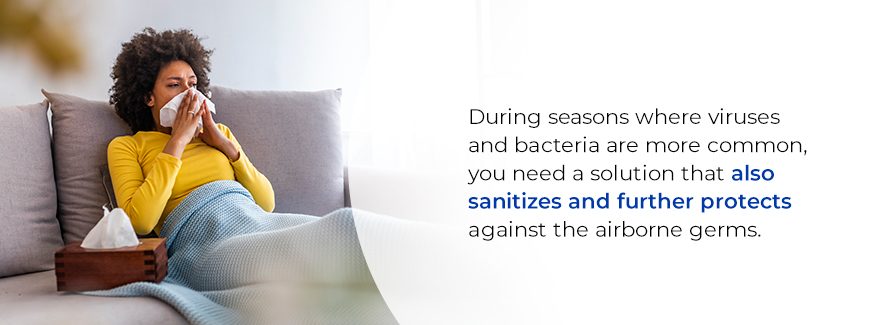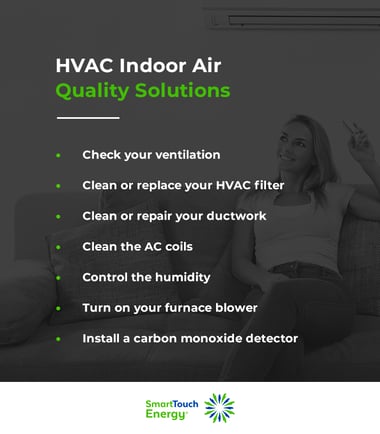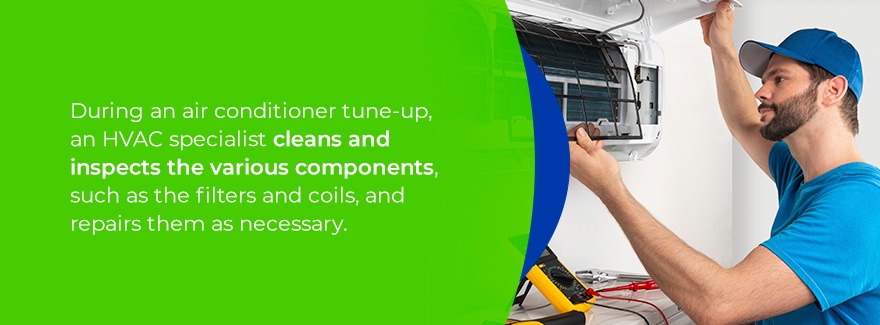The air inside your home could be two to five times more polluted than the air outdoors due to dust, pet dander, cleaning products and bacteria. Low indoor air quality (IAQ) can worsen allergies and upper respiratory conditions, and a moist environment can keep mold and bacteria in your living space, increasing your potential for getting sick. Since you spend a lot of time at home, it is beneficial to consider ways to improve the air you and your family inhale each day — and one way is with the help of your heating, ventilation and air conditioning (HVAC) system.
Your HVAC system does more than regulate your home's temperature. It can also positively or negatively influence your property's IAQ. All forced-air HVAC units need air filters that keep the parts inside the air handler clean, but if dust and debris get stuck inside, they could travel into your home. This guide will give you some tips on how to use your HVAC to improve indoor air quality.
How Your HVAC System Affects Your Home's Indoor Air Quality
Most people spend up to 90 percent of their day indoors, so it is essential to have a healthy air quality inside your home. You might want to think about replacing your air conditioning unit if it is reducing your home's IAQ. Mold and mildew could form in the system and contaminate the air coming out of the ductwork. Older HVAC units also contain R-22, an outdated refrigerant that produces a high level of carbon emissions. A brand-new air conditioner can help you keep allergens and debris out of your living space.
The HVAC system affects your home's indoor air quality, both positively and negatively, in the following ways:
- Eliminates odors and pollutants: The unit brings in air from the outside and sends it through a filtration system that gets rid of odors and allergens. Having a functioning filter helps keep outside pollutants out of your living space to reduce allergies and asthma symptoms.
- Keeps out pests: A functioning central air system includes ductwork and filters that can help keep out insects and pests. However, if you have leaky ductwork or openings around your wall or window unit, rodents and insects could sneak into your home and produce waste.
- Regulates indoor humidity: Besides heating and cooling your living space, an HVAC system also eliminates the moisture in the air. An environment that is too moist can make you sweaty and uncomfortable, but it could also lead to a build-up of mold, mildew and bacteria. In the winter, an environment that is too dry can make you more susceptible to illness. If you can control your home's humidity with your HVAC system, you have a better chance of staying healthy all year long.
- Provides adequate ventilation: The fan in your HVAC unit can provide the proper airflow for your house. Newer construction homes have tight seals around them to enhance their energy efficiency, but these seals can also make the air stale, increasing pollutants and moisture. On the other hand, a functioning ventilation system moves the air throughout your home to prevent mold and other allergens from growing.
Indoor Air Quality Solutions for Purifying the Air

HVAC systems can clean the dirt and debris out of the air, but during seasons where viruses and bacteria are more common, you need a solution that also sanitizes and further protects against the airborne germs. Here are some of the tools you can use to enhance your HVAC system and protect yourself from getting sick:
- High-efficiency filters: You can get a high-quality filtration system installed in your HVAC unit to sanitize the air. HEPA filters and other high-efficiency purification systems can get rid of viruses and bacteria in the atmosphere. Consult your HVAC specialist about if a high-efficiency filter can accommodate your current system or if you would need to invest in a portable air purifier.
- Ultraviolet (UV) light and ionization technology: Some air purifiers and other cleaning products feature UV light and ionization that eliminates viruses. These devices go inside your HVAC system to get rid of germs inside the ductwork before they can go into your living space.
- Increase ventilation: Making sure your home has adequate airflow is a simple way to reduce your risk of contracting an illness. Besides using your air conditioner, you could also open the windows throughout the house and run exhaust fans while in the kitchen and bathroom. The fan in your HVAC system also activates the air filtration system you have installed.
Keep in mind that these methods cannot cure or prevent viruses and bacteria. High-efficiency filters might not trap smaller particles, and the UV light ionization technology does not kill all the germs in the air. However, since they reduce the presence of illness-causing microbes, you have a higher chance of staying healthy.
HVAC Indoor Air Quality Solutions
To improve your home's indoor air quality, try the following techniques to sanitize your HVAC system and make your home cleaner:
- Check your ventilation: Stale air could host viruses and bacteria, so it is essential to have a functioning ventilation system. The fan in your HVAC unit can help to eliminate odors and contaminants from the various rooms in your living space. Even though these components cannot get rid of viruses and bacteria, they can reduce the allergy and asthma symptoms that could compromise your immune system.
 Clean or replace your HVAC filter: The filter captures dust and debris so that they do not come inside your living space. It is best to clean the dirt out of your HVAC filters about once a month. Check for rips and holes in it and replace it as necessary.
Clean or replace your HVAC filter: The filter captures dust and debris so that they do not come inside your living space. It is best to clean the dirt out of your HVAC filters about once a month. Check for rips and holes in it and replace it as necessary.- Clean or repair your ductwork: Having your ducts inspected and cleaned can help to get rid of mold or dust that may affect your home's IAQ. An HVAC specialist can tighten up the seals of your ductwork and thoroughly wash this complex system.
- Clean the AC coils: The evaporator coil in your indoor air handling unit absorbs the humidity and heat from your living space, and the outdoor condenser coil brings the heat outside. Your air conditioner's coils provide reliable operation for your HVAC system, so you need to inspect them from dirt and clean them about once a year.
- Control the humidity: Condensate and drain lines can become clogged, trapping moisture inside and leaving room for bacteria, mold and mildew to grow. Make sure your air conditioner is functioning so that it can remove excess humidity from your home's atmosphere.
- Turn on your furnace blower: In the winter, you could increase circulation and ventilation by turning on your furnace's blower. Install a filtration system, like the one that goes in your air conditioner, in your furnace to eliminate dust and contaminants.
- Install a carbon monoxide detector: Various household appliances could produce carbon monoxide. Inhaling a high level of this gas could result in dizziness, nausea and unconsciousness. A carbon monoxide detector can alert you when you have too much of it in your house.
Other Indoor Air Quality Solutions
Besides cleaning and inspecting your HVAC system, you could improve your home's IAQ in the following ways:
- Add greenery: Houseplants such as English ivy and bamboo palm take in the carbon dioxide you exhale and convert it to oxygen for you to inhale. This filtration system is all-natural and provides a cost-effective decoration for your living space.
- Clean your floors: Besides installing a proper ventilation and filtration system, you can mop, sweep or vacuum your flooring at least once a week. You bring grime and debris in from the outside, and you kick it up and send it into the air as you walk. It could also help to use doormats and remove your shoes by the entrance rather than wearing them through the house.
- Eliminate smoking in the house: Tobacco found in cigarettes contains several pollutants that reduce your home's IAQ. If you or your loved ones practice this habit, kindly ask them to smoke outside.
- Use non-toxic cleaning products: Many products you can buy to clean your clothes, furniture and countertops contain artificial fragrances and harmful chemicals. When possible, try removing dust from an area with water and a microfiber cloth instead of commercial cleaning products. You could also look out for all-natural cleaners that won't harm your health.
- Watch out for formaldehyde in your furniture: Certain wooden pieces contain adhesives made with formaldehyde, a toxic gas. Look out for this material in your walls, furniture, carpeting, flooring and decorations, and try to get rid of them.
- Paint with eco-friendly products: Most paint contains volatile organic compounds (VOCs), which are harmful to breathe. If you need to add a new color to a room in your living space, try to use VOC-free or low-VOC products.
- Groom your pets: Animal dander could produce allergens that reduce the air quality of your living space. Additionally, a clogged filter from shed pet fur could make your HVAC system have to work harder, decreasing its energy efficiency. Make sure you groom your pet regularly so that you can keep up with the pet hair and clean flakes off their skin.
- Clean your fans: Dust can collect in your ceiling and floor fans if you do not clean them often. As they spin over and around your property, they could blow the allergens all over the room. Cleaning your fans at least once a week can help to get rid of dust buildup.
- Install a hood range vented to the outside: Make sure the oven's hood range has adequate airflow to the outside. Even if you have a microwave oven with an exhaust fan underneath it, be sure your hood is wide enough to capture all the oil, grease and humidity in the air and send it outside.
The Importance of Routine HVAC Maintenance
A functioning air conditioner improves your home's air quality by getting rid of heat and humidity, providing proper ventilation and traps dirt and contaminants. If you are concerned about your living space's IAQ, consider investing in routine HVAC maintenance to make sure your HVAC system works properly all year long. During an air conditioner tune-up, an HVAC specialist cleans and inspects the various components, such as the filters and coils, and repairs them as necessary.

Routine maintenance of your HVAC system helps prevent pollutants and moisture from getting stuck inside your ductwork and unit as well. If you do not take care of it properly, you might have to pay for costly repairs or even a full replacement. Besides improving your home's air quality, here are some of the other benefits of HVAC maintenance:
- Prevent harmful leaks and damage: The refrigerant and carbon monoxide in your air conditioner and furnace could leak out of the unit. Having an HVAC specialist inspect your system can help protect it from failure. Even if it is broken, an HVAC specialist can repair refrigerant leaks and cracks in your furnace to help avoid damage to your property.
- Increase your system's lifespan: A high-quality HVAC unit can last for a couple of decades if you correctly use it. Dirt and grime that gets stuck inside your system will make it work harder to produce comfortable air. During a routine maintenance appointment, a technician cleans the ducts, coils and filters so that your system can function at its best.
- Save money on utility bills every once: Besides reducing your risk of spreading germs, investing in routine HVAC maintenance could also help reduce your monthly expenses. A high-functioning, energy-efficient air conditioner or furnace uses less energy, so it costs less money to operate.
- Be comfortable in your home: When your HVAC system functions properly, you can have comfortable air all year long. Having a technician look at your unit about twice a year allows your system to control your home's temperature and humidity so that you will not be sweating in the summer or shivering in the winter.
Smart Touch Energy Can Help You Improve Indoor Air Quality in Your Home
At Smart Touch Energy, we offer air conditioning tune-up services, where we clean the various components of your cooling system and lubricate the metal parts to restore their performance. With our oil burner cleaning services, we make sure your furnace is ready to keep you warm in the winter by cleaning your unit and filling your tank with oil.
If you would like to improve your home's indoor air quality with HVAC maintenance, enter your zip code to discover if we serve your area. Then, a specialist will reach out to you to schedule a routine maintenance appointment.




